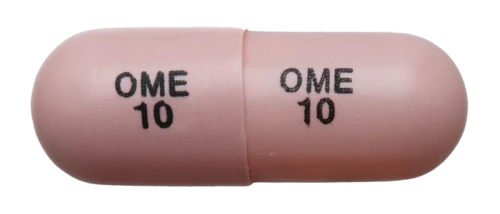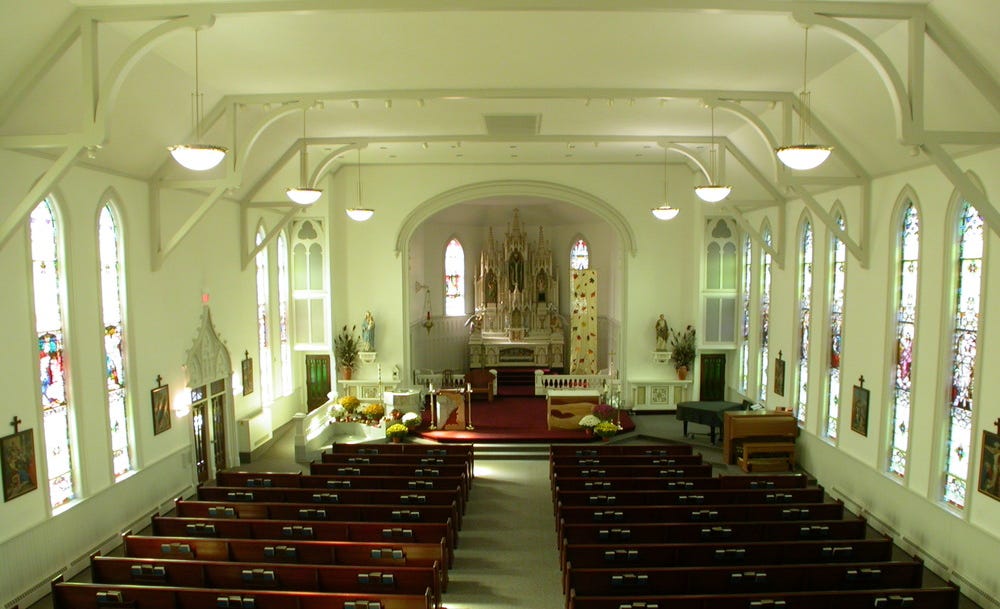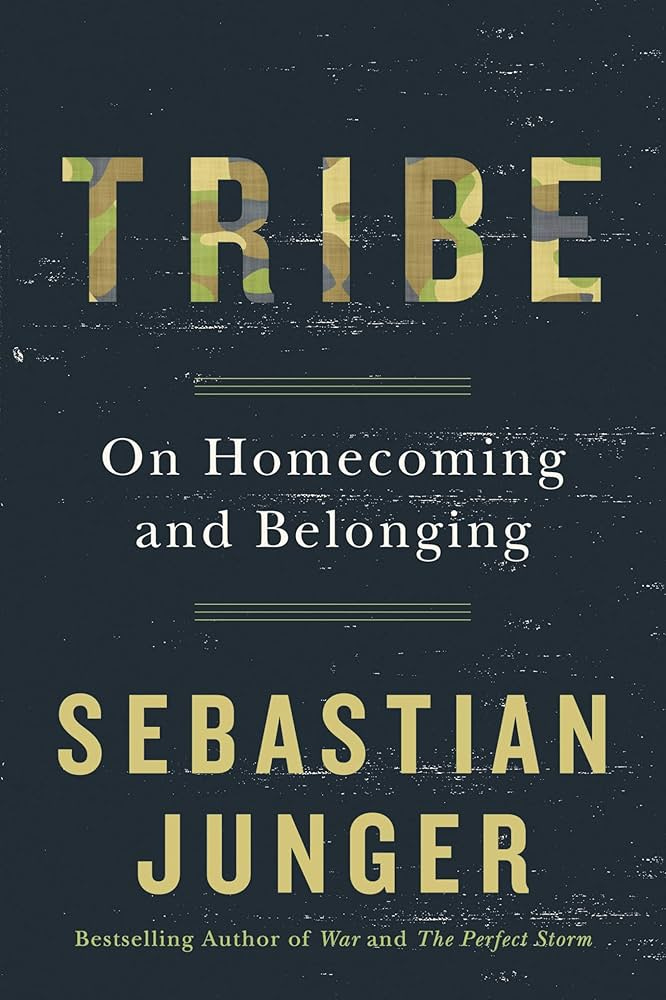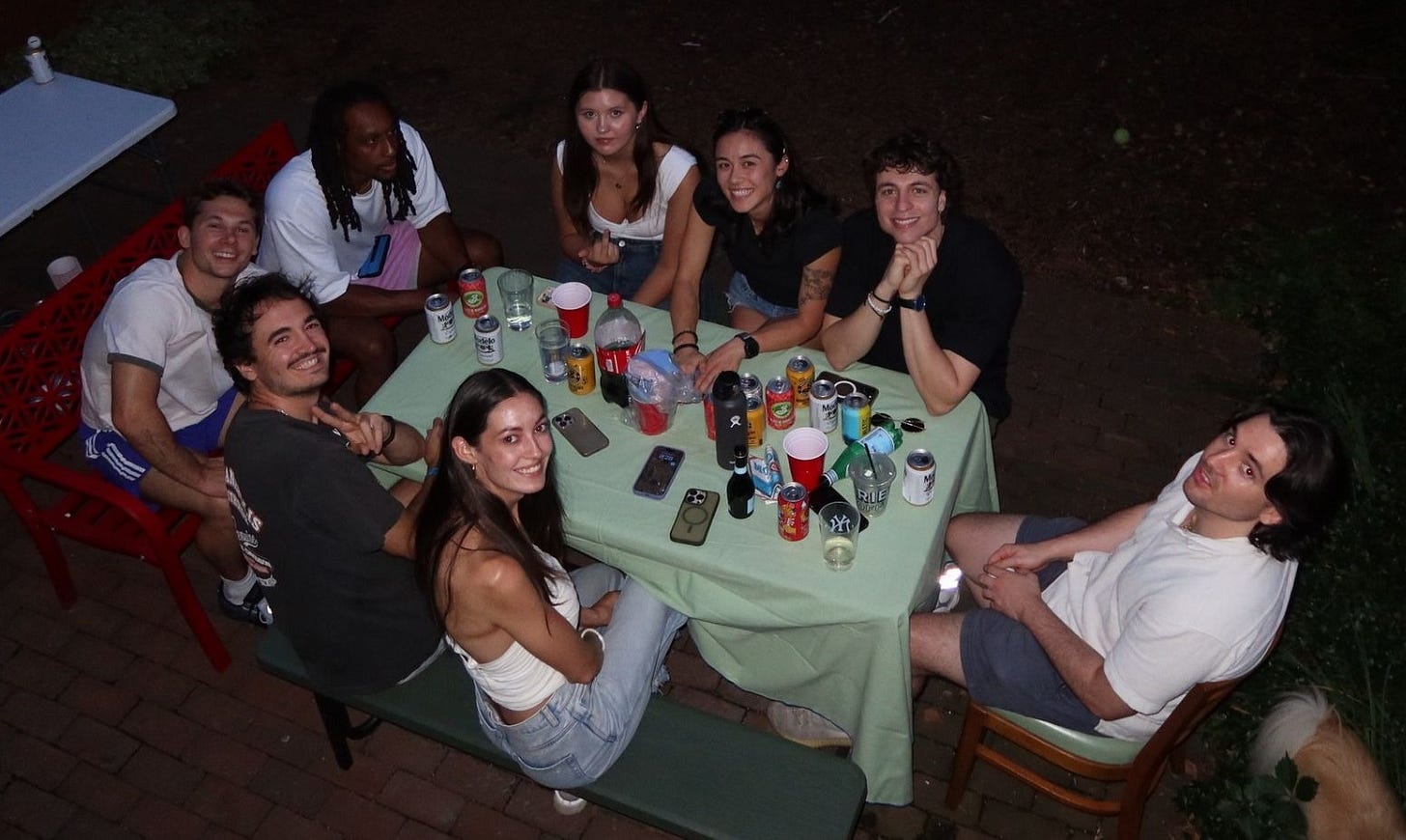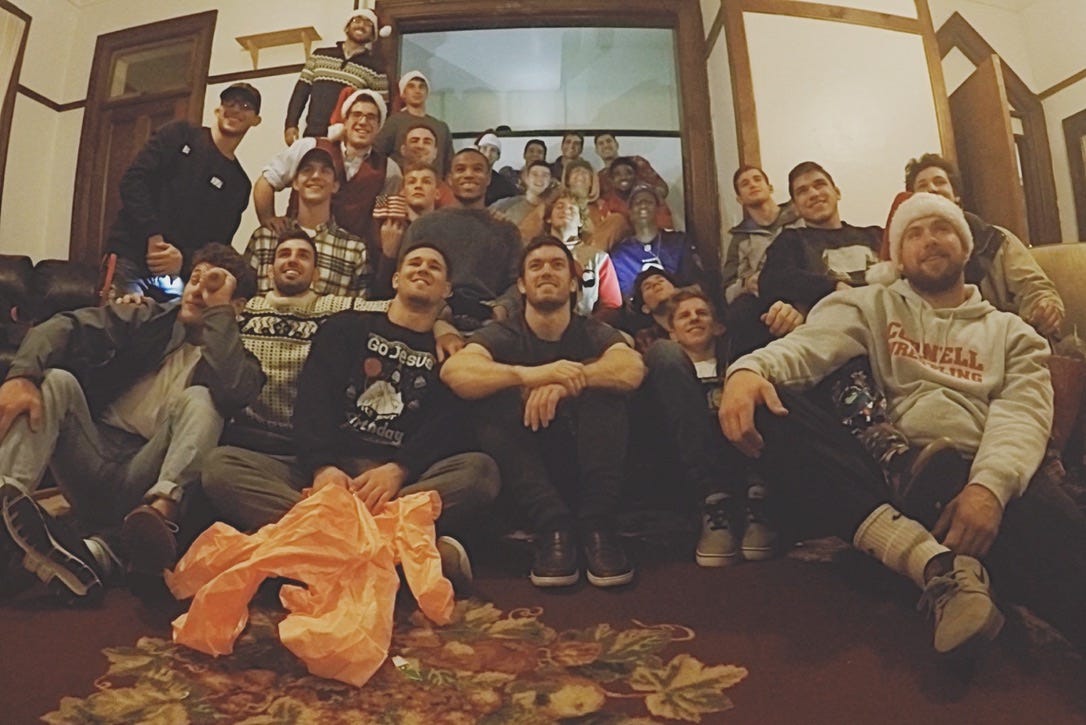Optimizing Won't Fix Us
What does Sebastian Junger Know About Mental Illness & Loneliness
I take great care not to label things “My” unless they serve me. This is something I haven’t always done, but in recent years, as I’ve learned about the power of language, I try to have my goals and intentions marry the words I use. Not long ago, I used to take “my meds,” but I don’t yearn to be on medication. I like to embrace the fullness of life’s ups and downs—the anxiety, the depression, the frustration, the anger, most especially the love and passion and intense feelings that come with surrounding yourself with the powerful things life has to offer.
But this is not reality. I cannot be there for others when I have anxiety—for numerous reasons—but most noticeably so, because I get acid reflux, and if I have acid reflux, I simply cannot think about anything other than eliminating the sensations that accompany acid reflux. It becomes the mission of every waking second to find a solution to the burning and knot-in-throat sensations that bubble up my esophagus and into the back of my throat. The inability to swallow without thinking about swallowing, which makes swallowing harder, more manual, which makes me think about it more, which makes me question if I have esophageal cancer, ALS, thyroid cancer, colon cancer, lymphoma, or some other debilitating disease. I fear telling a doctor because they’ll likely say those fears are irrational—and that will make me crazier, because I’ll try to take their advice, and let it go, but my brain will toss one last irrational thought my way: that I’ll survive with said rare disease to the point of no solution, to stage 4, when it will be too late.
Anxiety medication was my lifeline in college. That 50mg dose of Zoloft every morning, inhibiting the reuptake of serotonin, leaving my brain in a mellow, happy syrup that reinforced an outward golden retriever attitude. I didn’t feel unwell if I accidentally missed a day. I didn’t notice egregious side effects when I drank alcohol, which, at that point, I was consuming in binge quite regularly. The Zoloft didn’t really “work” for situational anxiety at that dose, I wasn’t “immune” to panic, which was frustrating but okay. I’m incredibly sensitive to how I feel, and medications—no matter how mild—that can have an instant and impactful effect often create a sense of derealization, hyperxifaction, or obsessive internal thoughts for me. I’ve never gone above 50mg, even though at times, a higher dose likely would have done wonders.
The More Recent Protocol
The state of anxiety in my life is palpable when I’m in it. I can’t remember back to a time when I wasn’t, which makes it all the more mood-killing. My current state is probably nearing or exceeding the pinnacle of my gut-reactive anxiety. I wake up nightly with an empty stomach in pain to the point of night sweats. The pain typically wakes me around 2:30 am and keeps me tossing for the next hour. In the morning I wake up with my heart in my throat, but about 30 minutes into the day, everything begins to subside a little; GERD-wise, at least. The anxiety sticks around, exhausting me to the point of needing caffeine, which exacerbates both the GERD and the anxiety, but is necessary to get things done. Because if I get nothing done, I’ll fall into depression, which for me is less cerebral than anxiety and harder to control, and typically spins me between both disorders for months until I get the opportunity to really calm down on some mulit-day vacation, long weekend, or crisis point event—an unprompted 10-mile run where I don’t force a productive event, don’t fixate or listen to my thoughts, I just watch them float by as I mentally check out.
Living this way makes very little sense, even to me, yet I can’t seem to shake it. It’s as if this feeling was written in my own bones, instilled in me from conception—though it didn’t properly manifest until my late teens. I can’t seem to think of another way to operate. When I try to change that perspective, the outside world out of my control—my job, my friendships, my health—they all seem to become at-will, and my effort becomes powerless to the world’s imperative. At least if I gave everything my 100 percent best effort and something didn’t go in my favor, that wasn’t my fault, it just wasn’t for me. But if things don’t go in my favor and I wanted them but didn’t give my all? Well, that’s my fault.
My protocol was forged through trial and error, but after a month of consistency and the eventual inclusion of a new Zoloft prescription starting at 25mg, I eventually won.
The protocol: Wake up, immediately leave bed, omeprazole, sip exactly 24oz alkaline water (pH 9.5), stand upright for 30 minutes (no sitting—acid might flow backward), lukewarm shower, brush teeth with baking soda paste, meditate in anti-reflux position, L-theanine, single piece of toast (chew each bite 16 times on each side), two egg whites, probiotic with 60 billion CFUs, walk around house for 45 minutes, elevate torso on wedge pillow while answering emails, small bland lunch (beige foods only), ginger tea, Pepto, another 32oz water, stand or use walking desk for 2 hours, extremely boring dinner, second Pepto, Tums chaser, more water, brush teeth while remaining vertical, second omeprazole, bite guard, sleep exclusively on left side (right side creates an acid highway), elevate entire upper body on pillows, keep antacids on nightstand. If woken up for any reason throughout the night, take Tums preventatively, return to the exact left-side position. Repeat.
This routine was developed over seven months between October 2024 and March 2025.
March 28, 2016
I am inherently existential. Not sure when it happened. Maybe when, one of the people I was closest too my entire childhood, my grandmother, died. Maybe when the kid next to me in computer class killed himself because some girl told him to. Maybe it started to happen senior year when a member of our graduating class died days before graduation (the timing initially seemed important, but in hindsight it’s tragic regardless). Maybe the coinciding cancer diagnosis of a mother-son we are close family-friend with just after I got accepted to Cornell—and an OCD fixation that balance is required—and their pain occurring at the same time as my relief would one day require a rebalancing. It also so happened that I now had something to lose. Before Cornell, frankly, things didn’t really matter, and I was at peace with that. I didn’t think long-term and candidly had zero vision of what I wanted to happen after high school graduation. Now I had everything I thought I wanted, and I was freaked out to lose it.
I’m now existential to a fault. When movie characters die, my brain frenzies to what their last thoughts were. Does an instant death allow for brain synapses to occur so the experience becomes spiritual—life flashing before their eyes, reliving their best memories? Or does the victim who gets shot in the head just go black, done, gone... peaceful? Definitely not peaceful for anyone else. That’s the worst part about existential thinking—wondering what everyone does after. Knowing it’s all going to continue just without you. But that’s also peaceful and a potent ego-dissolving solution.
My existentialism peaked after a brief mental health episode in 2016. This near psychotic break initiated my SSRI prescription. A break I’ve never really told anyone about, not even the doctor who prescribed me. A break where I visualized disturbing images that felt so real and active that I feared I would act them out. A break that made me afraid to be alone in a house with guns in it. A break not initiated by drugs or any real catalyst event, but maybe a sense of isolation and a never-ending state of anxiety that had persisted for months, leading to many sleepless nights—I would be grateful to get more than 3 hours.
A break that, immediately after a sense of reality returned, sent me grabbing my car keys and speeding directly to our local church, where I sat panicking alone in a pew for what felt like hours but was closer to 45 minutes of mumbled Hail Marys with eyes squinted shut and fearful tears streaming down. Internally, I begged God for someone to come save me, for the priest who confirmed me to walk into the church at 2 pm on a Wednesday, March 28, 2016, and to bless my mind with positive thoughts. But that didn’t happen. I panic-walked out, faster and faster, to my car. I drove home with very little memory of the last several hours and sat in my parents’ driveway. I called my primary care doctor—voicemail. I looked up hotlines, but felt too ashamed to call. I sat there and put on The Human Condition album, by Jon Bellion, like I had for months, to calm me down. At this point, I couldn’t feel anything. My panic had progressed from attack to full-blown derealization. My body was cold, my breath uncontrolled. I looked up at the top of the car, squeezed my hand tightly against the wheel, and pitied every cell in my entire body until I received a call back from the primary care office.
I must note that now that this episode is well in my past, I feel more comfortable writing and speaking about it. But for a long time, I was severely ashamed. I couldn’t tell you why I felt that way, but I believe the rest of this essay may provide insight into why I and others tend to suffer in silence.
What does Sebastian Junger Know
Many people are on SSRIs. The world is not great right now, and bless you if you can sustain life without medication and manage your emotions—but no matter who you are, if you aren’t triggered by something right now, you’re either ignorant or incompetent.
Shortly after beginning medication, I read a book by Sebastian Junger, a war photographer, called Tribe. In it, he argues that humans are hardwired to respond to adversity, that our emotional reactions to crises aren’t pathological—they’re adaptive. The problem isn’t that we feel anxious or depressed; it’s that we’re experiencing these ancient alarm systems in a context they weren’t designed for.
I must preface I don’t agree with all of Sebastian Junger’s takes, this isn’t a fan piece, but rather an analysis of a particular notion that has stuck in my brain ever since that first read.
What struck me was Junger’s writing about how soldiers returning from war often struggle not because of what they experienced in combat, but because they come home to a society that’s fundamentally atomized, where no one needs anyone else, where suffering happens in isolation (see my own isolation and shame above). He documents case after case of veterans who describe their time in combat—despite the horror, despite watching friends die—as the most meaningful period of their lives. Not because war is good, but because, for maybe the first time ever, they mattered to other people in a way that was immediate and undeniable. Their survival depended on the group. The group’s survival depended on them. And when they come home to a society where you can go weeks without a single person actually needing you for anything? Where your existence is optional to everyone around you? That’s when the real psychological damage sets in. Junger calls it “the tragedy of modern life”—we’ve built a world where we don’t require each other, and our brains interpret that, “freedom” as abandonment.
Another story: the London Blitz. When Nazi bombs were falling on the city every single night, psychiatric hospitals emptied out (people didn’t want their loved ones to die alone in the loony bin). Crime rates dropped. Suicide rates plummeted. Civilians slept in the Underground together, strangers held each other’s children, people shared their last bit of food. It wasn’t that the trauma disappeared; it was that people finally had what humans are biologically desperate for: a reason to need each other. A common threat. A tribe. The moment the bombing stopped and everyone went back to their separate lives—depression rates skyrocketed again.
If you’ve been an adult in America over the last decade, you probably understand this. We have never been more emotionally charged as a species, and simultaneously so rude, separated, and easily manipulated. Technology, temporarily a community builder, now it creates cults, self-hatred, and dangerous thinking. I can feel it in myself—the way my phone has become an everyday pacifier, a replacement for actual human connection, a way to feel like I’m participating in something when really I’m just watching other people participate.
When it comes to having a tribe, does anybody have that anymore? People don’t love each other like we once did. Families don’t love each other like they once did. Our capitalistic-authoritarian hellscape has stripped parents from their children—healthcare is unaffordable, benefits are hardly supplemental anymore, wages and paid time off haven’t seen significant increases in decades. People used to have TRUE parental figures in their lives consistently, whether a teacher at school or a parent at home. Now kids learn not to need those things within months of being born (even daycare is now unobtainable), and eventually they end up sitting on their phones in their rooms getting radicalized, spammed with dopamine, addicted to stimuli unsustainable by the natural world.
Junger pointed this out: depression and PTSD rates are significantly higher in wealthy, individualistic societies like the United States than in poor, communal societies experiencing actual war and famine. We’re more depressed, more anxious, more medicated than people living in active war zones. Because those people still have tribes. They still need each other. And we have what? The option to order groceries without speaking to a human. The ability to work from home and go days without physical contact. We’ve achieved a level of independence that our ancestors would have considered a death sentence, and we wonder why our nervous systems are screaming.
The Real Threat
Anxiety isn’t just a disorder—I know this now, even though I still carry it around like it’s some personal failing. It’s a reasonable response to living in a world where I wake up at 2:30 am with my stomach in knots because I’m biologically wired to need a tribe, and instead I have a protocol. The alkaline water. The anti-reflux position. The left-side sleeping position exclusively because the right side creates an acid highway.
Junger would probably say I’ve built an elaborate ritual to manage a problem that shouldn’t exist in the first place. That if I lived in a society where I belonged to something larger than myself, where my survival was tied to others and theirs to mine, where I woke up every morning with a clear understanding of my role and my value to the group, my nervous system wouldn’t be misfiring at 2:30 am searching for threats that aren’t there—or worse, correctly identifying that the threat is there: it’s the isolation itself. He writes that humans are “not well suited to living in a society that doesn’t require their participation,” and I feel that in my bones. In my acid-burned esophagus. In the way I chew each bite 32 times not because it helps, but because it gives me something to control when really the problem is that nothing I do matters to anyone but me.
The Pepto doesn’t need me. The alkaline water doesn’t care if I show up. And neither does anyone else, not really (see above where I spoke about the ego-death of knowing everything will be totally chill after I am gone), and not in the way Junger describes—not in the life-or-death, I-need-you-and-you-need-me, we’re-in-this-together way that human brains were designed for. So instead I have this: a seven-month protocol developed through trial and error, a prescription for Zoloft, and the knowledge that each day I am performing to convince my body that I’m safe when every cell seems to know something I don’t. And, not because there’s a war outside. But because there’s one happening in my lizard brain.
But here’s what Junger would also tell me, and what I’m starting to learn through actual lived experience: the solution isn’t more omeprazole. It’s people.
Is Having A Tribe Just Choosing to Trust Others Unconditionally?
I recently started working a job that feels communal and supportive—not in the fake corporate “we’re a family here” way, but in the actual sense that people check in on each other, that my work matters to the team and their work matters to me. The Substance Use Disorder crisis needs people willing to work to make a difference. There are occasional opportunities to join conferences and be in person with a community of people doing similar work, facing similar challenges, and every single time I come back from one of those events, my mind eases up for a few days. It’s not coincidence. My nervous system finally gets what it’s been screaming for: proof that I’m part of something, that I belong somewhere, that participation is required.
Moving to New York has helped in ways I didn’t expect. Getting together with friends often—not occasionally, not when schedules align perfectly, but often—has been helpful. Even simple things like the neighborhood I moved to: seeing the same people on walks, recognizing faces in our building, the guy at our bodega who knows my falafel over rice order, the restaurants we frequent where the servers are familiar. Even the dog that requires walks twice a day. These tiny repeated interactions that seem insignificant are actually doing the heavy lifting my medication can’t do alone. They’re building something Junger would recognize immediately: micro-tribes. Small pockets of belonging that remind my brain, over and over, that I’m not alone, that I am real, that I exist in other people’s worlds and they exist in mine.
I still waste hours a day on screentime—it’s embarrassing how many hours—but even that I can work on and control. And here’s what I’ve noticed: the more impactful time I spend actually connecting with people, face-to-face, in the same physical space, the lower the screentime tends to be. It’s not even a conscious choice. I just... forget to check my phone. I don’t need to. Because the thing my brain was searching for through endless scrolling—connection, mattering, belonging—I’m actually getting in real life. And I can feel my anxiety and depression ease each time I get out of the apartment and into the real world. Like my nervous system finally exhales a little, finally stops scanning for threats, finally registers: “Oh, okay, we’re not alone. The tribe is here. We can rest.”
Junger writes that humans can survive almost anything—war, famine, natural disasters—as long as they face it together. What we can’t survive, what breaks us down at the cellular level, is facing ordinary life alone.
And that’s really what this has all been about. Not some chemical imbalance that needs correcting, not some personal weakness or character flaw—but a reasonable, biological response to a society that’s designed to keep us separate. Our bodies are trying to tell us something, and we keep treating that like the problem instead of listening to what they’re asking for: connection. Belonging. A reason to get out of bed that has nothing to do with alkaline water and everything to do with other people needing us to show up.
This is all of us, building elaborate protocols to manage problems that are fundamentally about isolation. We’re medicating, optimizing, biohacking, and self-helping our way through a crisis that can’t be solved individually because the crisis itself is that we’re trying to do everything individually. We’ve mistaken the symptoms for the disease. The disease is that we’re alone. The symptoms are just how our bodies are trying to tell us.
Knowing this helps, but putting in the time to change the way we live is where the actual work gets done.
I’m not cured, not even close, I don’t even know if cured is an option. After an 18-month hiatus and several Reddit posts about my successful taper and post-SSRI life management in the Zoloft subreddit, I am, once again, back on the Zollies. I still have heartburn when I isolate and overwork myself. But I’m starting to understand that the solution isn’t perfecting anything—it’s breaking isolation in every sense that I can.




